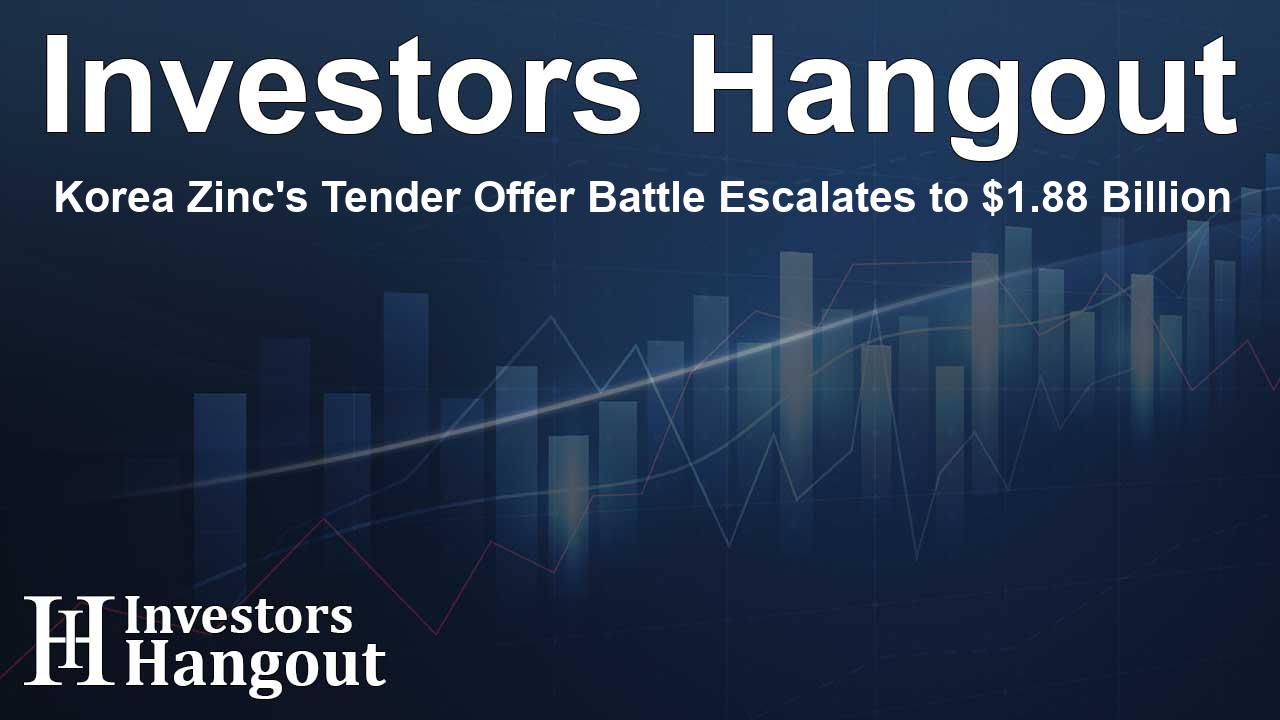Korea Zinc's Tender Offer Battle Escalates to $1.88 Billion

Tender Offer for Korea Zinc Intensifies
In a significant move, MBK Partners and Young Poong have heightened their tender offer for shares in Korea Zinc, engaging in an escalating takeover battle for the world's largest refined zinc producer. This competitive environment reflects the broader implications for global supply chains, especially in industries reliant on zinc.
The Details of the Offer
The freshly raised tender offer now stands at 2.51 trillion won, equating to approximately $1.88 billion, with the deadline extended to mid-October. The offer is strategically designed to match a prior counteroffer, signaling the seriousness of the bidding war.
Background of the Companies Involved
Korea Zinc, under the leadership of the Choi family, is embroiled in a tense struggle for control against the Chang family. This contention hints at deeper dynamics within the corporate landscape of South Korea. The Chang family's conglomerate, Young Poong, partnered with MBK in September to make an initial proposal, which has since been adjusted to counter rival offerings.
The Stakes Involved
Both MBK and Young Poong, along with their supporters, each hold substantial stakes in Korea Zinc, amounting to roughly a third of the company. Their intentions are clear: to gain control over a crucial supplier that plays a vital role in modern industries, including semiconductors and electric vehicles. The recent increase in Korea Zinc's stock price underscores investor confidence amidst this competitive allure, rising notably after announcements regarding the latest offer.
Global Attention on Supply Chain Management
The implications of this struggle extend beyond financial metrics. Korea Zinc's pivotal role in the supply of materials for high-tech industries has caught the attention of global markets. The urgency to secure supply chains has intensified, particularly given the backdrop of escalating trade tensions between the U.S. and China.
Market Reactions
Following the news of the tender offer, Korea Zinc's shares reached a peak, illustrating the market's response to the unfolding takeover drama. Currently, the shares are priced lower than the latest offer price, suggesting continued speculation and volatility in the stock.
Future of Korea Zinc
As the tender offer proceedings unfold, Korea Zinc is also engaged in a share buyback scheme alongside Bain Capital, intending to reclaim shares valued at approximately 2.7 trillion won. This multifaceted approach showcases the company's strategic maneuvering amidst a competitive landscape.
Corporate Governance Implications
This takeover battle holds critical implications for corporate governance reforms within South Korea, aiming to mitigate the predominance of large conglomerates over market dynamics. Minority shareholders will play a pivotal role in deciding the future direction of Korea Zinc, acting as key influences in the upcoming decisions.
Technology and Future Prospects
Korea Zinc's request to classify its battery technology as a national core technology reflects its importance in the modern economy. The potential for implications regarding foreign acquisitions suggests a strategic pivot towards maintaining control over essential industry assets.
Investing in Sustainability
Korea Zinc is not only focusing on zinc production but is also exploring territories in renewable energy. The establishment of Ark Energy, a subsidiary specializing in hydrogen, signifies a commitment to diversifying beyond traditional mining operations. This aligns with a growing trend towards sustainability and reduced reliance on fossil fuels.
Conclusion and Implications
The intense bidding for Korea Zinc encapsulates a broader narrative concerning supply chain security and corporate governance in the context of South Korea’s economy. As the situation develops, stakeholders from various sectors will closely monitor the negotiations, with potential repercussions felt across the globe.
Frequently Asked Questions
What is the current tender offer price for Korea Zinc?
The recent tender offer price for Korea Zinc is 830,000 won per share, totaling approximately $1.88 billion.
Who are the main players in the Korea Zinc tender offer?
The main players in this tender offer include MBK Partners and Young Poong, both of which are vying for control of Korea Zinc.
Why is Korea Zinc significant in the global market?
Korea Zinc is the world’s largest refined zinc producer, playing a critical role in supplying materials for industries like semiconductors and electric vehicles.
What are the implications of the tender offer for corporate governance?
This tender offer highlights the need for reforms in South Korea's corporate governance landscape, particularly addressing the power dynamic of conglomerates.
How does this tender offer impact Korea Zinc's shareholders?
The outcome of this bidding war is crucial for minority shareholders, as it could substantially affect their investment and governance of the company.
About Investors Hangout
Investors Hangout is a leading online stock forum for financial discussion and learning, offering a wide range of free tools and resources. It draws in traders of all levels, who exchange market knowledge, investigate trading tactics, and keep an eye on industry developments in real time. Featuring financial articles, stock message boards, quotes, charts, company profiles, and live news updates. Through cooperative learning and a wealth of informational resources, it helps users from novices creating their first portfolios to experts honing their techniques. Join Investors Hangout today: https://investorshangout.com/
Disclaimer: The content of this article is solely for general informational purposes only; it does not represent legal, financial, or investment advice. Investors Hangout does not offer financial advice; the author is not a licensed financial advisor. Consult a qualified advisor before making any financial or investment decisions based on this article. The author's interpretation of publicly available data shapes the opinions presented here; as a result, they should not be taken as advice to purchase, sell, or hold any securities mentioned or any other investments. The author does not guarantee the accuracy, completeness, or timeliness of any material, providing it "as is." Information and market conditions may change; past performance is not indicative of future outcomes. If any of the material offered here is inaccurate, please contact us for corrections.